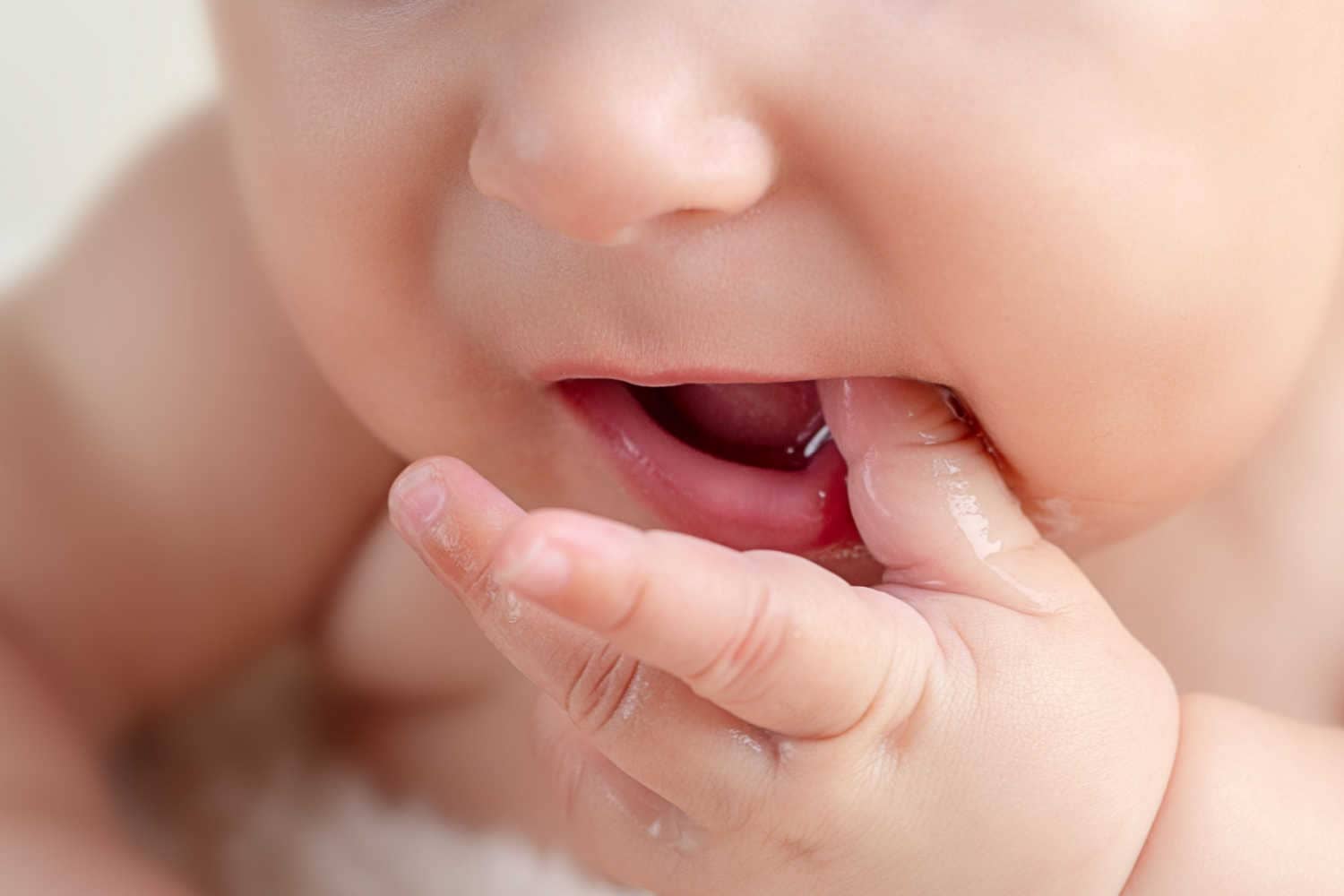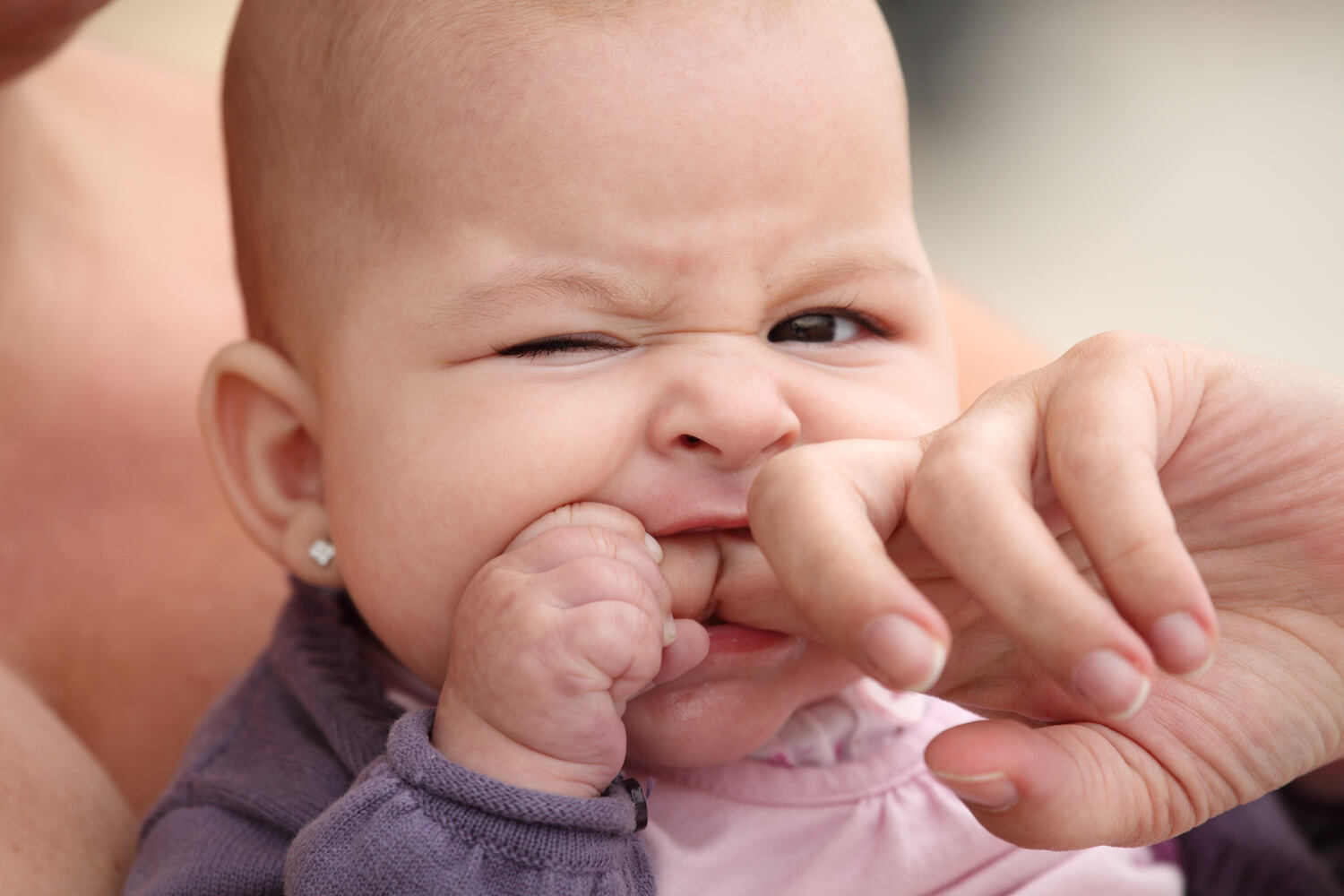
Babies often suffer from sore gums which can lead to a lot of crying and crankiness. There are many reasons for sore gums in babies. While finding the root cause and providing necessary care can help, helping the babies through this phase itself can be exhausting for the parents and caregivers.
Differentiating between sore gums and teething pain becomes important to understand what kind of care can be given to the baby. While teething is one of the main causes of gum pain, there can be many other underlying causes. It is important to know why sore gums can happen in babies and what care and precautions you can take.
In This Article
- What Causes Sore Gums in Babies?
- Sore Gum Vs Teething Pain
- How Do I Know If My Baby’s Gums Are Infected?
- Precautions While Dealing With Sore Gums In Babies
- When to Consult a Doctor For Sore Gums in Babies?
- FAQ’s
What Causes Sore Gums in Babies?

Soreness and swelling of a baby’s gums can happen due to various reasons.
1. Teething
Teething is the process of tooth eruption in babies. It may start at the age of around six months and last until around 30 months, by when the baby has a set of 20 deciduous/ milk teeth. Swollen gums due to teething will subside once the tooth erupts out of the gums. Normal teething symptoms include excessive drooling, mild fever, irritable mood, loss of appetite, sleeplessness, repeated pulling of ears, and putting fingers and toys in the mouth [1].
[Read : Stages of Teething in Babies]
2. Eruption Gingivitis
A little inflammation of the gums (gingiva) commonly occurs as the tooth tears the gum open and erupts into the oral cavity. But in the case of poor oral hygiene, the inflammation might get aggravated, leading to a condition called eruption gingivitis. It usually subsides as the hygiene levels improve. This may gradually progress to form an eruption cyst [2].
3. Trauma
Any fall or injury might also cause swelling in the gums of the baby. Although not very common, the ones mentioned below are some other reasons for swollen gums in babies.
4. Primary Herpetic Gingivostomatitis
It is a viral gum infection caused by the herpes virus. This infection usually affects children below the age of six years and may affect babies too. Primary herpetic gingivostomatitis can cause severe gum swelling, gum bleeding, and a mild fever [3].
5. Drug-Induced Gingival Overgrowth
Certain medicines like immunosuppressants (Cyclosporine), anticonvulsants (Phenytoin), and calcium channel blockers might also cause the gums to swell [4].
Sore Gum vs Teething Pain
Often sore gums and teething pain may be interlinked since tender, and swollen gums are a common symptom of teething in babies. However, certain characteristic features distinguish each other.
| Nutrients | Nutrients | Value |
| Is it Normal? | Teething is a normal physiological process that occurs in babies due to primary or baby teeth eruption. Teething pain may eventually subside once the new tooth erupts. | Sore gums may not always be due to teething (though it is a common teething symptom). It can occur due to other reasons such as gingival inflammation (gingivitis) and hyperplasia (overgrowth). Sore gums may not subside until the underlying cause is treated, even after tooth eruption. |
| Cause | Occurs during primary teeth eruption when gums tear apart to accommodate the new tooth. | Occurs due to an inflammatory response leading to gingival swelling. |
| Symptoms | Irritation, gnawing pain around the eruption site, and poor appetite are the common symptoms of teething pain. | Gum inflammation may lead to tender, painful gums, and fever. In extreme cases, you may notice a fluid-filled lump (cyst), and gingival bleeding. |
| Management | Teething pain can be managed with conservative methods like using teething rings, massaging the baby’s gums using finger pressure, or through prescription painkiller syrups. | Sore gums can be managed with conservative methods, but this condition may require management of the underlying cause to eliminate infection. |
How Do I Know If My Baby’s Gums Are Infected?
The most obvious symptom of gum infection is gums that are red and inflamed. The presence of fever is a symptom that often accompanies gum infection. The baby will get very agitated and will continue to put their hand in their mouth no matter what. They have a propensity for inserting hard objects, such as teethers, into the mouth.
Precautions While Dealing With Sore Gums In Babies

Remember to massage lightly when massaging your baby’s gums and avoid being harsh or using too much pressure. Other preventive actions include
a. Hygiene
When a baby has swollen gums from teething, strict hygiene precautions are vital because babies drool excessively and want to put whatever they discover into their mouths.
b. Brushing
You must brush the baby’s teeth twice a day using fluoride-free toothpaste and a soft, gentle toothbrush designed for infants.
c. Massaging
Gum massaging can help reduce gum pain. While massaging their gums, try diverting their attention with an activity.
d. Teething Rings
Purchase high-quality teething rings or pacifiers for your infant. Also, remember to sanitize these teething rings regularly to avoid infections in your child. Avoid using teething rings that are filled with liquid since they might leak and cannot be disinfected.
c. Chewing
If you have given your infant anything difficult to chew, keep a close check on them. This is because your infant may consume larger bits, posing a choking danger.
When to Consult a Doctor For Sore Gums in Babies?

Generally, sore gums in babies resolve with the help of the tips mentioned above or reduce in intensity once the new tooth erupts. You can also give them over-the-counter pain medications like ibuprofen that help relieve discomfort caused by swollen and sore gums. However, despite all the tips and tricks, if your baby suffers from a high fever (> 101 ℉ rectal temperature), disturbed sleep, is extremely irritable, and is not feeding well then it is time to consult a doctor. There may be an underlying issue that requires medical attention.
Swollen and sore gums are one of the most common symptoms that tell you your little one has begun teething. Babies can experience irritation and discomfort during this process. If your baby is struggling with sore gums, there are tips to help them with this situation.
FAQ’s
1. Do Babies’ Gums Hurt When Teething?
Gums swell and become very sensitive as a tooth is poised to erupt through them. This means that everything they put in their mouths might potentially increase their level of pain.
2. How Long Does Gum Pain Last For Babies?
For most newborns, the symptoms of gum discomfort linked with teething are minimal and occasional. The gum discomfort may linger for around 8 days, but if numerous teeth break through at the same time, the gum pain can stay much longer.
References
- Teething in children and the alleviation of symptoms – PubMed – [https://pubmed.ncbi.nlm.nih.gov/12415773/]
- Eruption cysts: A series of two cases – PMC – [https://www.ncbi.nlm.nih.gov/pmc/articles/PMC3612207/]
- Primary herpetic gingivostomatitis–clinical aspects and anti-viral treatment – [https://pubmed.ncbi.nlm.nih.gov/11851116/]
Read Also: Top Tips to Treat Sore Gums in Babies

